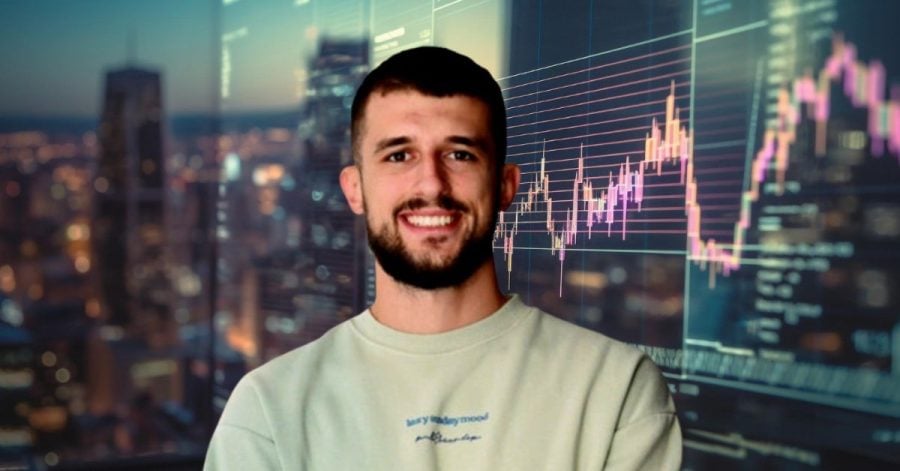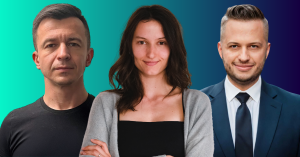For Nick Gospodinov, the young Bulgarian mind behind the AI-powered financial controller Fynt, it has never been “go big or go home”. Instead, it is rather “go big from home”. And it is precisely this mentality that managed to get the Bulgarian startup accepted into the Y Combinator (YC) program.
Fynt is only the second Bulgarian company to ever get into the famous Silicon Valley accelerator. The startup received $500K from YC, consisting of $125K for a 7% equity stake and $375K in a SAFE note that will convert into their next fundraising round.
For Gospodinov, born and raised in Burgas, it has also been a journey filled with different challenges, and one that has both started and ended up in Bulgaria. A part of the problem was that they didn’t have a clear structure, with their initial product being an open banking solution – something which thoroughly changed after getting into YC.
However, as the young entrepreneur explains, up until that point, the foreign VCs didn’t like the fact that the startup came from Bulgaria and there was only local traction, while all the Bulgarian VCs were extremely conservative, although most had insisted that “they wanted to be the first check”.
Therefore, traction outside Bulgaria became a critical requirement for many international investors, while the traction they already had in Bulgaria wasn’t enough for Bulgarian VCs to support them.
“We haven’t proved the markets. All of our traction was in Bulgaria and although we were doing pretty good, I felt like everything was kind of against us. At that point everything was funded by us. We quit our jobs. And we had to put all the money into the startup. And of course, we borrowed a lot of money. So that was really hard when nobody pretty much wanted to support us even with a little bit of money,” Gospodinov tells The Recursive.
All of this changed when Nick and his co-founder Alex Bonin decided to apply to YC. Things become radically different when it comes to funding opportunities.
“After YC we received a lot of interest from investors. YC gives you a network of investors, so on the day of launching or Launch YC we got probably 40-50 investors that reached out. On Demo Day there were another 40-50, so you get a lot of investors inbound,” Gospodinov says.
The confidence and courage to pivot
What was even more important for him, was that YC gave the company the confidence and courage to pivot.
“The biggest thing is that YC instills more confidence in you than anything else. You need to be confident in the fact that even though you are currently lost, you need to be confident in the fact that okay, you might not have a product market fit, but you are looking for it. You need to be confident in pivots as well. And one of the biggest lessons is what Michael Seibel (main partner at Y combinator) said: you are always two to three key insights away from being a billion-dollar company. And those key insights come from experimentation and not from sticking to the actual playbook,” Gospodinov explains.
And it was exactly what Gospodinov and Fynt did. From an open banking payment solution, the Bulgarian startup is now doing something completely different, which Gospodinov describes as “an AI brain for autonomous decision-making in operations and finance”.
“AI has become a tool maker, something that allows you to be general in the way that you interact with it, but also pretty specific in the tasks that it can create and execute. What we’re trying to do is connect it to all the operational and financial data of businesses, see the way your data interacts inside the company. Then, the AI can actually, on command, answer questions on what’s happening inside the business, predict data in terms of the future outcomes of your business, in terms of how you can optimize your pricing, and so on,” he tells The Recursive.
Here, Gospodinov learned another important lesson – work on solutions that bring total innovation to the market.
“I learned that I don’t like working on solutions that are not “Zero to One” – solutions that bring something that was not possible or completely manual before. I felt that with our previous product, we were not bringing this and it was a sideways innovation. It was something that was saving a lot of money for merchants by skipping the card networks. But I feel like when it comes to the consumers, they don’t care what they pay with,” he explains.
The obstacles and potentials of building from Bulgaria
After YC, the choice that Gospodinov made was to come back to Bulgaria – and build big from here. As he says, there are many reasons for making such a decision.
“With how expensive the US is, especially California, we decided that it’s smarter right now, especially during our seed stage, to hire all the great and smart people in Bulgaria that we can get, to develop the product, get as much traction as possible, and expand the team into the US,” he says.
However, he is still very much cautious about the shortcomings that Bulgaria has. As mentioned before, first how Bulgarian VCs are approaching startups, but also how startups are approaching the issues that they are trying to solve.
“I think there’s a misconception that Bulgaria is like the Silicon Valley of the Balkans. We’re probably a little bit more developed than some of the other countries but I feel like if you were thinking that you can get like a billion dollar company from here targeting the region, of course there’s a chance like the money is there. However, any startup should aim to maximize their chances of success. And you can’t maximize it if you’re targeting the market here,” Gospodinov says.
The talent though, is pretty much the main advantage that Bulgaria can count on and provide to all of those that want to create a successful company out of the country. And this is something that Gospodinov strongly advocates for. The key to success according to him? Always go global, even from day one.
“Go global from day one, be ambitious. I feel that with the amount of talented people that we have in Bulgaria, people are trying too much to just solve Bulgarian problems. And with the vast amount of ambitious people we have here, we can solve bigger problems. With all of the talent, there’s a potential for not only a billion, but a 100 billion dollars company coming out of the region,” Gospodinov argues.
And this has pretty much became Fynt’s motto, aiming to be much more than just a local Bulgarian fintech.
“I truly believe that we have exceptionally smart people here, this has been proven by Payhawk’s success, proven by INSAIT recently, and proven by pretty much everyone I’ve met growing up in high school and seeing all the mathematics champions and so on. And I feel that I want to have the best possible people that believe in this future and want to build it together with us,” he concludes.








